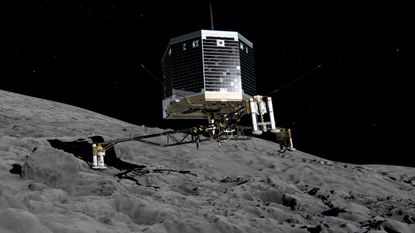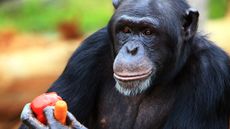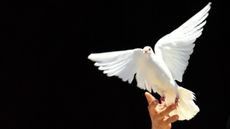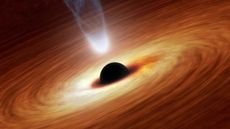Rosetta researchers find 'building blocks of life' on comet
Philae lander discovered 'primordial soup' that could suggest comets helped seed life on Earth

Researchers from the European Space Agency's Rosetta mission have offered fascinating new insights into the comet 67P/Churyumov-Gerasimenko, including evidence that comets may have seeded life on Earth.
Seven papers, published yesterday in the journal Science, drew on information acquired by the Philae lander during its first three days on the comet before its batteries faded.
One intriguing discovery came from material gathered by the lander's Ptolemy instrument, which found evidence for organic material on the comet's surface that appears to be a "frozen primordial soup".
Subscribe to The Week
Escape your echo chamber. Get the facts behind the news, plus analysis from multiple perspectives.

Sign up for The Week's Free Newsletters
From our morning news briefing to a weekly Good News Newsletter, get the best of The Week delivered directly to your inbox.
From our morning news briefing to a weekly Good News Newsletter, get the best of The Week delivered directly to your inbox.
Ian Wright, Ptolemy's lead scientist, said: "If you were to put these materials on the surface of a primitive body like Earth, and give them the right amount of heat and whatever else is required, conceivably, you could form life." The European Space Agency readily admits its landing on the comet did not go to plan. Philae was meant to deploy harpoons to anchor itself to the comet's surface, but the anchoring system failed to fire causing the lander to skip across the comet's surface.
Fortunately, the probe collided with the rim of a crater, bringing it to rest in an area from which it could gather data and communicate with Earth.
From its final resting place, Philae captured panoramic photos of the comet's surface, including "evidence of erosion, with boulders surrounded by dips in the surface that look similar to tailwind depressions caused by wind on Earth", The Guardian reports.
This information may prove crucial to future comet missions, Sky News reports.
After briefly "waking up" on July 7, the lander has now fallen silent and experts believe it may have been pushed into a new location by billowing gas emissions on the comet's surface. Scientists remain hopeful it will send back information from its sensors in the future.
"Philae is obviously still functional, because it sends us data, even if it does so at irregular intervals and at surprising times," Stephan Ulamec, Philae project manager at the DLR German Aerospace Centre, said in a statement.
Fred Goesmann, the lead scientist on COSAC at the Max Planck Institute for Solar System Research in Gottingen, says there may be new opportunities to communicate with the probe after August 8.
"Let's keep our fingers crossed," said Goesmann.
Rosetta comet 'may be home to alien life'
6 July
The Rosetta spacecraft's Philae lander has sent back information that could point to the existence of microbial alien life on Comet 67P, astronomers from the University of Cardiff have said.
Aspects of the comet, named 67P/Churyumov-Gerasimenko, are most easily explained by the presence of living organisms, scientists believe.
According to astronomer and astrobiologist Professor Chandra Wickramasinghe, the comet's black hydrocarbon crust could be home to microbes not dissimilar to the "extremophiles" found in some of the most inhospitable places on Earth, such as those that live deep in Antarctic ice or in the Mariana Trench.
Neither the Rosetta spacecraft nor its probe, the Philae lander, which touched down on 67P seven months ago, are equipped to search for life directly. A proposal to include such equipment was allegedly "laughed out of court" before the European Space Agency mission commenced, The Guardian reports. But the findings of the probe appear to support the chance of life, Wickramasinghe says, so people should be more open-minded to the possibility.
"Five hundred years ago it was a struggle to have people accept that the Earth was not the centre of the universe," he said. "After that revolution our thinking has remained Earth-centred in relation to life and biology. It's deeply ingrained in our scientific culture and it will take a lot of evidence to kick it over."
He and colleague Dr Max Wallis from the University of Cardiff argue that comets could have helped bring life to Earth, and to other planets in our solar system, including Mars.
Wallis will present his ideas to the Royal Astronomical Society's National Astronomy Meeting in Llandudno today, at which he will argue that Rosetta's discovery of "abundant complex organic molecules on the surface of the comet", are further evidence for possible life on the comet, The Independent reports.
Wickramasinghe said: "If the Rosetta orbiter has found evidence of life on the comet, it would be a fitting tribute to mark the centenary of the birth of Sir Fred Hoyle, one of the undisputable pioneers of astrobiology."
Create an account with the same email registered to your subscription to unlock access.
Sign up for Today's Best Articles in your inbox
A free daily email with the biggest news stories of the day – and the best features from TheWeek.com
-
 Today's political cartoons - April 28, 2024
Today's political cartoons - April 28, 2024Cartoons Sunday's cartoons - airline safety, teleprompter gaffs, and more
By The Week US Published
-
 5 doom 'n' gloom cartoons about the mess we're in
5 doom 'n' gloom cartoons about the mess we're inCartoons Artists take on long-term pessimism, dystopian fears, and more
By The Week US Published
-
 The Church of England's legacy of slavery
The Church of England's legacy of slaveryThe Explainer Should the CofE offer financial redress for its involvement in the transatlantic slave trade?
By The Week UK Published
-
 Historic Cornwall satellite launch ends in failure
Historic Cornwall satellite launch ends in failureSpeed Read The Virgin Orbit mission was the first attempt to launch satellites into space from British soil
By Sorcha Bradley Published
-
 Richard Branson’s Virgin Galactic and Jeff Bezos’s Blue Origin: the new space race?
Richard Branson’s Virgin Galactic and Jeff Bezos’s Blue Origin: the new space race?Speed Read Branson has declared space open for business. Is that still a pie in the sky?
By The Week Staff Published
-
 Russia and China joining forces to build first Moon base
Russia and China joining forces to build first Moon baseSpeed Read Lunar pact represents ‘all kinds of security threats’ to UK and US, expert warns
By Joe Evans Last updated
-
 Mystery of where Stonehenge stones came from finally solved
Mystery of where Stonehenge stones came from finally solvedSpeed Read But how the builders moved the huge stone megaliths to the Salisbury site remains a mystery
By Aaron Drapkin Last updated
-
 How chimpanzee ‘lip smacking’ can unlock mystery behind human speech
How chimpanzee ‘lip smacking’ can unlock mystery behind human speechSpeed Read New study reveals rhythm of great apes’ communications is identical to spoken language
By The Week Staff Published
-
 Could coronavirus lead to world peace?
Could coronavirus lead to world peace?Speed Read International leaders throw their weight behind plans for a global ceasefire – but will it hold?
By The Week Staff Last updated
-
What is an Earth sandwich?
Speed Read Two men create planet-sized snack by placing slices of bread on exact opposite sides of the planet
By The Week Staff Last updated
-
 Scientists discover new variety of black hole
Scientists discover new variety of black holeSpeed Read Astronomers had previously missed entire class of dead star
By James Ashford Last updated